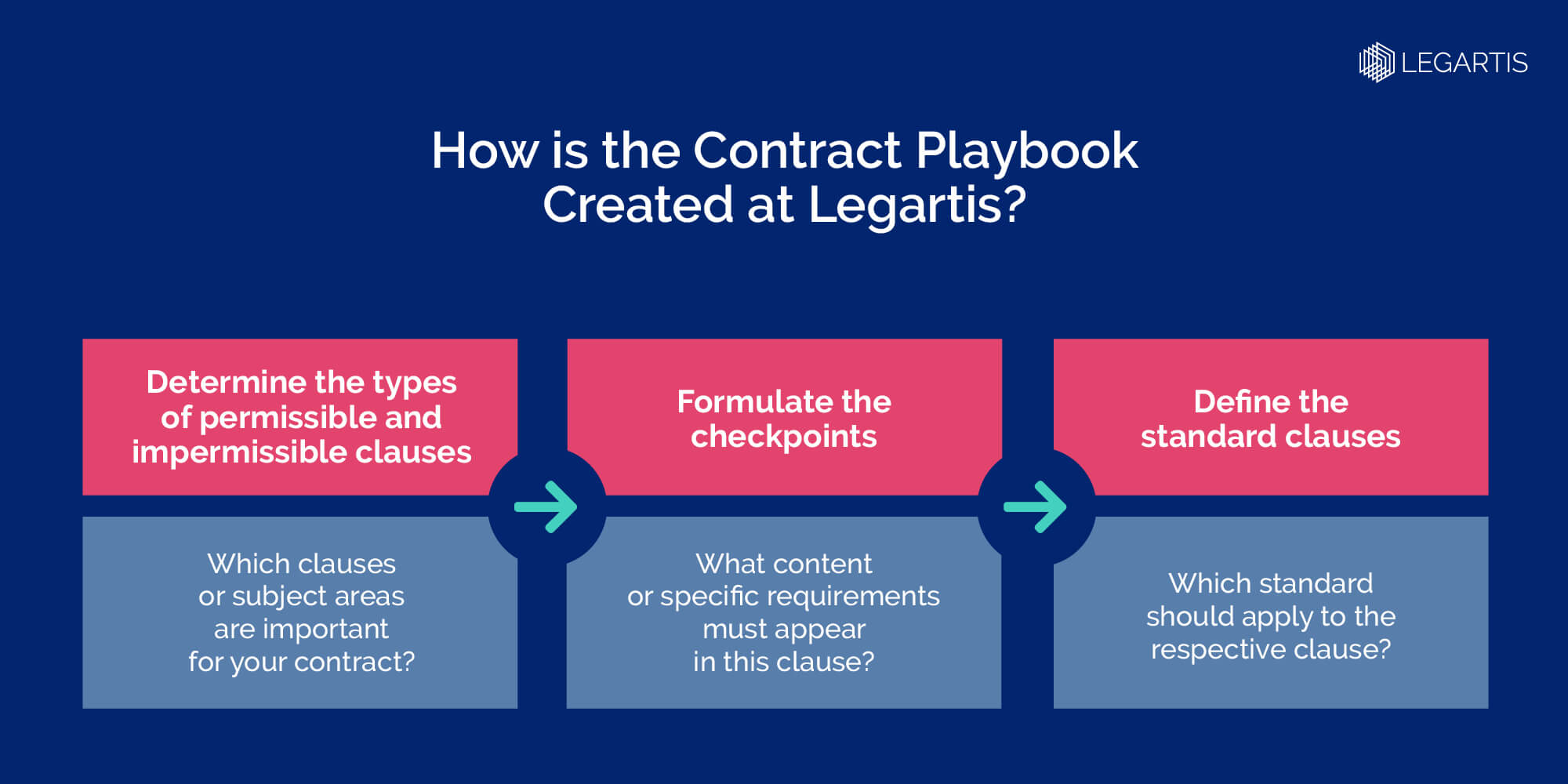Have you ever approached your legal department with a contract in urgent need of review and their response was: "Sure, we have time and will get to work on it right away"? Probably not. Legal teams are chronically overworked in most companies.
The result: specialist departments have to wait and are slowed down in their workflows. In this situation, the contract playbook becomes all the more important. This helpful tool enables even non-specialist employees to master important parts of contract negotiations themselves. But what is a contract playbook and in which situations can it be used?
What is a Contract Playbook?
A contract playbook is the company's internal basic set of rules for contract preparation and review. It summarises contract guidelines, lists standard clauses and outlines the permissible contract language. Which formulations are permitted and which count as "deal breakers"? A glance at the contract playbook makes this unmistakably clear.
Therefore, contract playbooks provide all employees with transparent, standardised instructions on how to defend contractual provisions, which alternatives they can offer their counterparts and which clauses are simply non-negotiable. But that's not all: the contract playbook also brings together a wealth of knowledge about the contract lifecycle, from negotiation to review and approval.
5 Facts About Contract Playbooks You Should Know
- Each type of contract needs its own contract playbook: contract playbooks do not cover a company's entire contract portfolio. They are built around and specialise in a single contract type.
- A contract playbook can take the form of a table or a web application: the contract playbook typically takes on a table format. Information on the clauses is placed in the individual rows of the spreadsheet. Legal tech solutions such as Legartis, on the other hand, embed the Contract Playbook in an application that simplifies collaboration and is accessible at any time via the internet.
- The contract playbook is created collaboratively: as a rule, the legal team is responsible for creating the contract playbook. Along these lines, it collects information and suggestions from the persons and departments of the company that work most frequently with the respective types of contracts.
- The initial drafting of the contract playbook takes no more than a week: putting together a contract playbook may seem like a laborious undertaking. However, in reality, the project can be completed in most cases in a few days: after all, the knowledge is already there, it just needs to be consolidated. How quickly you’ll have your first version in your hands depends mainly on the preparatory work you have already done. Do company templates already exist? Are you starting from scratch or can you build your work on existing guidelines on clauses and formulations?
- The contract playbook is never final, it’s constantly being adapted: just like legal contract work, playbooks are not static – they are a constantly evolving thing. Requirements change, new clauses are added, formulations are tailored to fit even better. Expect the process to be iterative and never fully completed.
Are you drafting your first contract playbook and looking for inspiration? Read the top 9 tips for creating a contract playbook now!
What is the Purpose of a Contract Playbook?
A carefully drafted contract playbook is an exceptional asset for all parties involved in the contract review process. You’ll find that, unlike many administrative writings, it won’t lay around gathering dust in a drawer, but will rather be put to frequent use. And indeed by:
- all employees who review a certain type of contract or negotiate with a counterparty.
- business users in sales or purchasing, as soon as they conclude a contract.
- risk management and compliance teams, who will use it to find an overview of the red flags.
- the legal team itself, which will use it as a guide when reviewing contracts.
A contract playbook is worthwhile in any case because it saves time and money, improves contract flow and reduces risks. We have summarised the most important advantages for you:
Contract Playbooks Enable Self-Service
Say goodbye to the legal department bottleneck! The playbook contains all the information you need to check contracts. This means that non-specialist staff can handle crucial legal aspects themselves without having to call in a lawyer.
Contract Playbooks Create Clarity
How exactly should I proceed with this type of contract? With a contract playbook at hand, this question no longer comes up. It explains all the important processes and rules to follow when negotiating a contract. This also minimises the risk of mistakes.
Contract Playbooks Improve Contract Review Performance
Get started instead of waiting – being independent from the legal department is the decisive advantage of the contract playbook for many users. From a business perspective, the playbook also acts as a lubricant between departments, ensuring seamless processes and improved performance.
Contract Playbooks Speed Up and Simplify the Onboarding of New Employees
The contract playbook acts as a central hub of knowledge for both existing and new colleagues. After an introductory training session, new hires are quickly able to get started with the contract review process. If they have questions they can always refer to the rules and regulations, which have clearly defined guidelines.
Contract Playbooks Bring Structure and Standardisation
With a contract playbook you’re laying the foundation for a structured and standardised contract creation and review process. Participants can refer to it to find out which company standards and guidelines they can fall back on.
How is the Contract Playbook Created at Legartis?

Do I need a Contract Playbook: 3 Key Takeaways
- The Contract Playbook provides a guideline for dealing with a specific type of contract. It contains information that business and legal teams can use to conduct contract negotiations and reviews on their own.
- Playbooks are created in a matter of days and are used in the drafting and review of contracts. They can be used by anyone involved in these processes.
- Contract playbooks are a great asset to companies. They optimise collaboration processes, provide clear guidelines for contract review and enable the use of innovative technology such as artificial intelligence (e.g. Legal AI) through standardisation.
Recommended Articles
Agentic Legal AI: When AI Shifts from Assistant to Actor
The days when AI in the legal industry was little more than a glorified spell checker are over. What sounded like science fiction just a few years ago is now reality: Agentic..
Agentic AI: Automated Generated Contract Playbooks
Every day, countless agreements are drafted, negotiated, and signed. For legal departments, legal-ops teams, and procurement leads, it is essential to keep track: Which..
Trends 2025: AI in Contract Analysis
The latest trends in Large Language Models (LLMs) show a shift towards greater efficiency, advanced AI agents and wider adoption across all industries. AI models are becoming..



